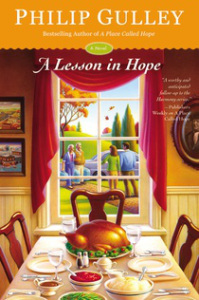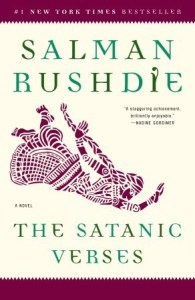Banned Books Month: Guest Post from Philip Gulley: On Humans and Censorship
I’m not sure when the first book was published, but I’m almost certain that when it was, a self-appointed guardian of the community read it, was incensed, and put a match to it. Had I been living then, and seen the flames eating away at the words, I would have been all the more eager to read them. That has always been my pattern. When I was 14 and my mother told me never to look at Playboy, I couldn’t wait to get my hands on one.

Center Street, September 2015.
To have one’s words condemned and burned is an exhilarating experience, especially if the criticism spurs sales, which is what happened to me when, after writing four books heavy on charm and nostalgia, I began dabbling in theology, co-authoring a book with Jim Mulholland, in which we gleefully, and may I modestly say masterfully, poked holes in the notion of hell. The book was called IF GRACE IS TRUE, and before it was even published, the critics boiled out of the woodwork. The kinder among them said they were praying for me. It is one thing to be prayed for when one is dying of cancer, and another thing to be prayed for when the one praying wants your mind to be changed and is enlisting God’s help to do it.
As I said, those were the kinder responses. Others, faithful Christians all, called for my horse-whipping, the revocation of my pastoral credentials, and my expulsion from the church. One lady rushed to her public library, checked out the book, burnt it, and sent me the ashes. It was, I suspect, the highlight of her censorious life, and I was so pleased to have supplied the opportunity that I mailed the library a new copy so she could do it again.
I escaped the horse-whipping, though the possibility fascinated me. Not the anticipation of pain, but the mechanics of the deal─the accusation, the charges filed, the trial, the finding of guilt, the sentence passed, the procurement of a horse whip and whipper, the punishment itself on our town’s square with my family and friends forced to watch, lest they also be tempted towards heresy.
It was on that same town square that I had gathered with my fellow citizens in 1968 to hear Michael Landon, of Bonanza fame, deliver a rousing speech on freedom, do a rope trick or two, and sign autographs.
I checked with our county historian to see if there had ever been a horse-whipping in our county and was surprised to learn one had never taken place. I would have been the first, which would have secured my place in history. A hundred years from now, my town, awash in post-horsewhipping guilt, would have erected a statue in my honor. We authors are fiends for fame and will take it any way we can get it, even if it kills us.

Random House, Paperback Edition, March 2008
When Salman Rushdie wrote THE SATANIC VERSES and was condemned to death, in absentia, he hid from the wingnuts who wanted to kill him, which was the worst possible thing he could have done. Had he let himself be killed, his fame would have been assured. Instead, he lived in hotels, moving from one city to another, eating bad food, wearing wigs when he went out, and maybe even wearing miniskirts to dupe his accusers, who wouldn’t have been able to look at him, thinking he was a she. Had they looked at him when he was a she, they would have gone straight to hell, according to their religion, which would have been not only ironic, but also hysterical and the best revenge Salman Rushdie could have taken.
While writing IF GRACE IS TRUE, I prayed daily that Pat Robertson would be so incensed he would issue a death warrant against me, my own personal fatwa, rocketing the book into the stratosphere. Alas, he did me no such favor. Instead, I had to endure poorly written letters telling me I was the worst human being who had ever lived, which I corrected and returned, for free, without even being asked. Would the world’s worst person do that? I think not.
I’ve written fifteen books since then, all of them delightfully seditious in their own way, for I have never enjoyed a book whose sole purpose was to confirm my worldview. I like the book that stretches, that teases, that goads. Should that same book offend me, so be it. I would rather live in a country where a million readers were scandalized, than in a country in which even one writer were made to pull back the reins in fear.
PHILIP GULLEY, a Quaker pastor, has become the voice of small-town American life. Along with writing FRONT PORCH TALES, HOMETOWN TALES, and FOR EVERYTHING A SEASON, he is the author of the Harmony series of novels. Gulley lives in Indiana with his wife, Joan, and their sons.








